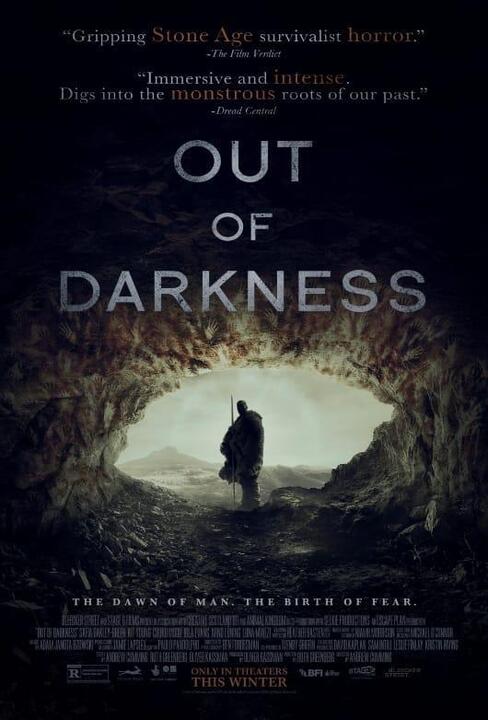
45,000 years ago, not a whole lot had been invented yet. Fire was a game changer, and so were clothes. We weren’t quite at agriculture yet, but along came a new class of technology that would revolutionize proto-human life: the pointy stick.
Murder was one of the first feats of human ingenuity.
Out of Darkness is a new horror film set in the Stone Age. It follows the voyage of a group of prehistoric exiles to a new promised land, which they find barren and already occupied. Adem is their leader: fierce, and quick to violence. His “wife,” Ave, is with child. His young son, Heron, is full of life. Meanwhile, brother Geirr and elder Odal are wary of their new home. Rounding out the group is Beyah, a stray at the fringes of the group and craftier than she looks.
The first half of the film is solidly a classic Man vs. Nature plot. Desperation quickly sets in as the group finds little to eat but the stripped remains of mammoths and other game. Strange noises echo in the dark. As they hunt, they are being hunted. Shot in Scotland, Out of Darkness excels at creating a desperate atmosphere through eerie nocturnal cinematography and haunting soundscape. I thought by now I’d be sick of the misty haunted forest — some recent examples being The Green Knight and The VVitch— but the utter desolation of Out of Darkness takes ‘wilderness’ to a new level. In this movie, it’s the tribe against everything else, even its own members.
Roughly midway through the film, Out of Darkness shifts to a Man vs. Man plot as the tribe fractures, and its members come face to face with the truth of the entities hunting them. A major draw of the film is the artificial Tola language that was invented specifically for the production. All of the dialogue is in Tola, and yet is so immersive and believable that I almost wish it hadn’t been subtitled at all. What really surprised me about this movie was how easy it was to grasp the basic principles of prehistoric life — survival, family, fear and rage. The movie reminds you that these things are still ingrained within our intuition. When the system built on these principles breaks down, as it does in Out of Darkness, they resort to another universal: violence. The film doesn’t depict the first murders committed by humanity, but shows us that, unfortunately, shedding the blood of others is coded within our own. The part I’m less satisfied about is that it tries to tell us this when it doesn’t need to.
Out of Darkness is really about the opposite phenomenon — it is an origin story of humanity’s darkness, of the atrocities we are capable of in the name of survival.